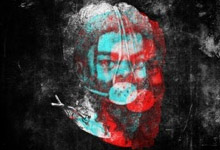
Tracks
Gonjasufi: "The Blame"
(2012)
By Chris Molnar | 3 March 2012
The coolest part of “The Blame” is how it sounds like a cassette tape dub of Lil’ Wayne’s “3 Peat,” which, come to think of it, is what makes Gonjasufi great to begin with. On A Sufi and a Killer, his 2010 debut, he upended the indie-rap template of all technical ability and no charisma, rejecting well-recorded lectures for gnomic pronouncements and psychedelic beats. He was and still is like a prehistoric Drake, or an alternate universe Gil Scott-Heron, fusing the elemental force of aphoristic spoken word with music treated to sound both futuristic and ancient.
On the flood of mini-releases since Sufi, of which MU.ZZ.LE is the third (and first to consist of new studio recordings), the erstwhile yoga instructor sketches smaller spaces than he ever has, using more synths than samples. Taking over production duties from Gaslamp Killer, whose crate-digging helped to define the first album’s vaguely ethnic garage-fuzz sound, Gonjasufi opts for Southern hip-hop decay, simpler beats lost in staticy wobbles.
“Children fucking blow up malls / Grown men fucking blow up dolls,” he drawls on “The Blame,” taking the tut-tutting of backpackers into cleverly expansive places. “I’ve done some things in my time / Even I’m ashamed of me,” he continues, not as evocative his similar invocation on Killer’s “Ancestors,” but nonetheless sold by his commanding, crusty presence.
The music video updates Eraserhead‘s vision of a post-apocalyptic Los Angeles, CGI sand filling the streets and Gonjasufi scurrying around with an old radio and a shopping cart. “The Blame” and MU.ZZ.LE may not expand his sonic territory, but they are welcome additions to his catalog, filling in the lines of his persona; something like a beat-wise Christopher Langan (the nightclub bouncer with the world’s highest recorded IQ), Gonjasufi’s gruff and dirty and genius. Too afraid, perhaps, to rise above the murk, to much more beyond shuffling around the remnants of the civilization he picks ragged pieces from, but his music’s always worth a listen, often making the murk sound preferable to whatever cleanliness he could front. An indispensable personality who has more possibility ahead of him than most show-off producers, rappers, singers, or bands, Gonjasufi continues to make the shiny mainstream sound young, naive, and out-of-touch.





